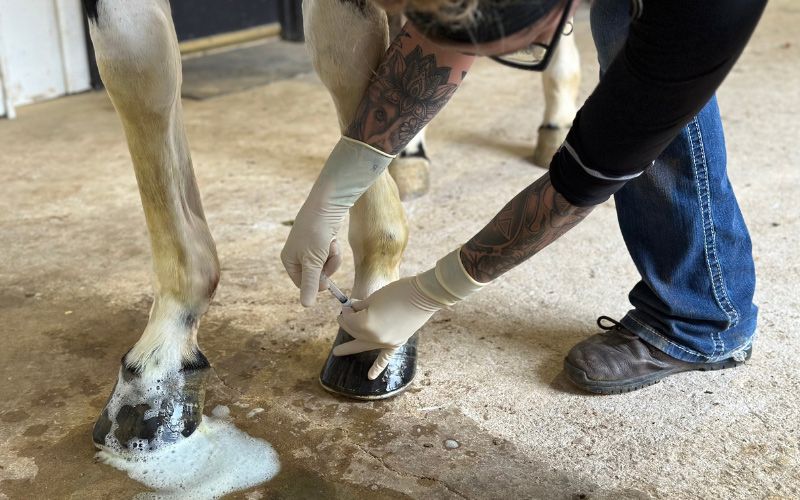Joint Injection Therapy
Joint Therapy for Horses
Joint injections can be an essential part of equine veterinary performance care that can significantly enhance a horse’s ability to compete. Understanding joint injections and how they fit into managing the equine performance athlete is an important part of competitive management of your equine athlete.

Improving Equine Athletic Performance with Joint Injections and Therapy
Horses, like athletes, are prone to wear and tear on their joints due to the physical demands of their competitive careers. Joint injections and therapy have become a crucial component in maintaining the health and performance of these animals. Here is how they can contribute to a horse’s ability to continue competing at their best.
-
Pain Relief: One of the primary goals of joint injections and therapy is to alleviate pain and discomfort. As horses age or engage in strenuous activities, their joints can experience inflammation and wear, leading to discomfort and reduced mobility. By reducing, or eliminating pain, these interventions help horses perform at their best.
-
Enhanced Mobility: Traditional joint maintenance includes injections with hyaluronic acid and/or corticosteroids. More modern options for joint injections include biologics or protein-based cushion technologies to promote longevity and comfort.
-
Accelerated Recovery: In cases of joint injuries, therapies like shockwave therapy, physical therapy, and controlled exercise programs can promote quicker healing and rehabilitation. In many cases, Pro Stride, IRAP or PRP can be used intra-articularly to promote quicker healing and reduce recovery time.
-
Extended Competitive Careers: Joint injections and therapy can help extend a horse’s competitive career by managing age-related joint issues and reducing complications of heavy wear and tear during competitive season. This means that seasoned horses can continue to compete at an elevated level, benefiting both the horse’s owners and the competitive world.
Commonly Injected Joints in Horses
Several joints in horses are commonly injected to address issues and improve performance. The most frequent joint injections performed are as follows:
-
Hocks (Tarsometatarsal and Distal Intertarsal)
-
Fetlocks
-
Stifle
-
Coffin
-
Sacroiliac (SI) Joints
-
Cervical/Neck
Types of Therapies That Can be Used in Joint Injections:
Based on the goal of joint injections, your veterinarian has several therapies to choose from including:
-
Biologics: A biologic is a product that is produced from the horse directly, or equine derived cells. Biologics are popular for their low tendency for reaction and natural healing effects. Common biologics used at HCP include: IRAP, Stem Cells, PRP, Pro-Stride, Renovo.
-
Synthetic Lubricant: Synthetic lubricants include traditional and modern versions of this type of therapy. Lubricants are thought to aid in reducing friction created by low synovial fluid (joint fluid) production in inflamed, degraded, or affected joints. The more well-known type of lubricant is hyaluronic acid, but newer options include hydrogels such as Noltrex and Athramid.
-
Protein Based Cushions: A protein-based option, Spryng, has come new to the market that claims to provide a shock absorbing matrix that works with synovial fluid to mimic the protective form and function of a natural healthy joint. A protein-based cushion can offer long term relief to large, or high mobile joints such as the fetlock, coffin, or stifle joint.
-
Corticosteroids: Steroids are the most well-known joint therapy used in joint injections and continued to be a staple in many treatment plans for performance horse management. Steroids are found to be effective in short term treatment and management of joint disease and can be used in conjunction with several other options to prove short and long-acting care.
It is important to note that joint injections are a part of the whole-horse approach to manage and maintain performance horses successfully through their careers. Joint injections require a proper diagnosis and a customized treatment plan from an experienced veterinarian. High Caliber Performance cherishes the ability to provide comprehensive veterinary sports medicine care that supports your horse at peak performance, longer. Call today to schedule a performance evaluation to see if joint injections may benefit your equine athlete!